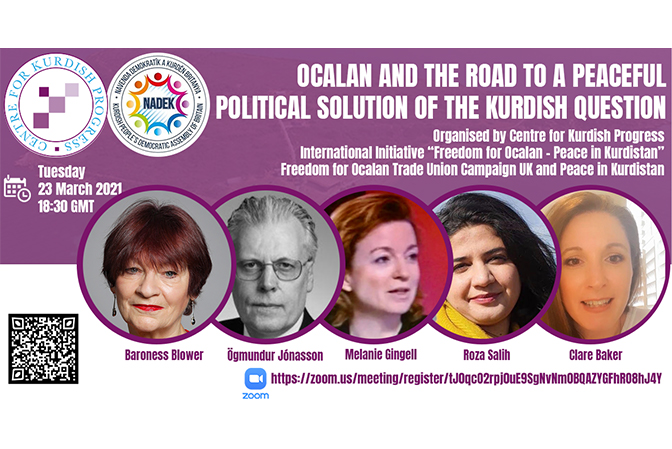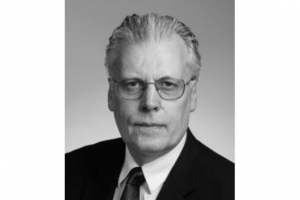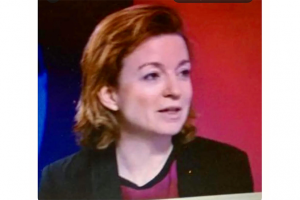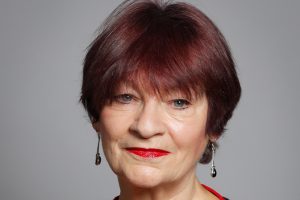Tuesday, 23 March 2021
6:30PM – 8PM GMT
Organised by Centre for Kurdish Progress, International Initiative “Freedom for Ocalan – Peace in Kurdistan”, Freedom for Ocalan Trade Union Campaign UK and Peace in Kurdistan.
The online talk discussed the recent two-day mission in Turkey by the four members of the 2021 Imrali Peace Delegation, which this time was virtual due to the COVID-19 pandemic. The speakers were Baroness Christine Blower, Vice-Chair of Unite Against Fascism and Co-chair of the UK trade union campaign Freedom for Öcalan; Roza Salih, SNP candidate for Scottish Assembly and Kurdish human rights activist; Clare Baker, International Officer UNITE the Union; and Ögmundur Jónasson, Former Justice Minister Iceland. The meeting was chaired by Melanie Gingell, barrister and member of the Steering Committee of Peace in Kurdistan. Gingell mentioned that the delegation talked to trade unionists, lawyers, activists, and elected officials and sought to understand the deterioration in human rights, political rights, women’s rights, and the worsening conditions in prisons and the conditions facing trade unions. Gingell also drew attention to Abdullah Öcalan, the leader of the Kurdish Freedom Movement, and his 22 years in prison, many of which have been spent in solitary confinement with his communication with the external world completely cut-off in recent years. The panellists elaborated further on the themes of the visit and considered how the overarching aim of re-energising the quest for peace can best be advanced.
The first speaker was Baroness Christine Blower, who focused her talk on women’s situation in Turkey. She began by highlighting the concerns around women’s safety in the UK following the abduction and murder of a young woman, Sarah Everard, in London. The incident led to an outpouring of grief and rage, and demands for change. Despite the widespread nature of the violence against women, the issue has not been tackled seriously by the state. She then mentioned Turkey withdrawing from the Istanbul Convention abruptly after the publication of a midnight decree even though it took a leading role in drafting it. She then discussed the deterioration in women’s rights in Turkey and the increase in the violence against women in Turkey. Baroness Blower said that the struggle of women in Turkey is of particular concern. As the Kurdish women rights group TJA described in their report, a multi-layer, multi-dimensional vicious cycle of violence was imposed on Kurdish women waging gender rights and identity struggles. She referred to the gains in women’s rights being targeted by the state and then drew attention to repression practices that the Kurdish struggle for women’s rights face. Targeting women’s organisation, closing them down, and making them illegal has profoundly impacted women’s rights in the region. She highlighted the important advances the women rights movement had made during the peace process and highlighted the co-presidency system as a significant achievement for empowering women in politics. She discussed removing the Peoples’ Democratic Party (HDP) co-mayors in 2016 and again recently as a direct challenge on women’s representation in politics and highlighted the importance of international solidarity and cooperation.
The second speaker was Roza Salih, who focused mainly on the repression of the Kurdish elected officials and the HDP. She mentioned that Turkey has a long history of banning political parties and repressing people who want democracy. Salih referred to the case of the HDP MP Ömer Faruk Gergerlioğlu, who has been told that he will be imprisoned, as an example of Turkey’s intolerance towards democracy. His only crime was tweeting about peace, and he is a human rights campaigner. Salih then referred to the censorship that Kurdish people in Turkey have been experiencing for many years. She said that even Kurdish people across Europe get censored when they publish something about Öcalan or his movement, and she has also been censored on Facebook. Salih described the constant attacks against the HDP as a political genocide and said that there was no freedom of speech in Turkey. Whoever speaks against Erdogan and his government will be jailed. People say that Turkey’s democracy is under threat, but there is no democracy in Turkey. She said that thousands of party members, MPs and mayors of the third-largest party in Turkey, the HDP, are in prison. Many of the elected officials who have been elected to represent millions of voters have been imprisoned. Salih stressed that this ruthless policy against politicians and journalists that the delegation found out about through its work was unacceptable. The international community needs to act and try to raise awareness about it. She highlighted the strong performance of the HDP in the past few years and said that this shows the people want the HDP to represent them. The EU needs to immediately use its influence over Ankara because it was ethnic cleansing by political means. Turkey was describing everyone as a terrorist and referred to the continuation of the imprisonment of the HDP co-chairs, Selahattin Demirtaş and Figen Yüksekdağ, despite the European Court of Human Rights (ECHR) decision that Demirtaş should be released immediately. The government was disregarding the court’s decision altogether.
The third speaker was Clare Baker, and she focused on the situation of the trade union movement and workers in Turkey. She began by thanking the people they met as part of the delegation’s work and the information they gave the delegation. She highlighted that the delegation met the KESK (the Public Service Trade Union Federation), who highlighted the situation facing Turkey’s independent trade unions. Baker mentioned that civil society organisations in Turkey have always faced repression from the state, but since the failed coup in 2016, this repression has intensified massively. She emphasised that the situation that faces trade unions, that faces Öcalan, and the Kurds in Turkey were all linked, and Erdogan was attacking all progressive forces in the country. The war on Kurds was extended to war on everyone who opposed him and stood up for human and worker rights. She said that KESK reported to the delegation that trade union members and human rights defenders continue to face serious problems in Turkey, including judicial harassment, arrests, detentions, and court cases against trade unionists. The oppressive political situation and the deficient legal system allows employers to fire workers en masse for union activity, which happens frequently and aims at crushing efforts by workers to organise, particularly within the independent trade unions. The reports the delegation collected highlight that independent trade unionists continue to face repression and intimidation, including losing their jobs and being arrested and imprisoned without due process. The trade union activists the delegation have spoken to have highlighted that the international organisations have not done enough about or taken a sufficient stance against human rights violations in Turkey. They have stated that many of the countries in Europe have taken a pro-Erdogan stance because of their economic interests, especially the EU, Germany, the UK and the US, which has adversely affected the attempts to address human rights violations in Turkey.
The final speaker was Ögmundur Jónasson, who provided a general overview of Turkey’s worsening human rights situation. Jónasson highlighted that there were signs of increased brutality in Turkish prisons, and they are overflowing with people demanding democracy. He referred to the hunger strikes taking place in prisons and mentioned that former HDP MP Leyla Güven, who started the hunger strike in 2018-19, has been arrested again and is now in jail. Jónasson said that the delegation wanted to understand whether the situation was getting worse or not, and the evaluation of their interlocutors was that it was deteriorating. The interlocutors described the regime as a “regime of impunity”, which he described as “not having consequences for whatever you do”. Jónasson said that this was happening both domestically and internationally. Domestically, trade unionists are being imprisoned, and they can’t go abroad if they are critical of the government, academics, lawyers, judges, journalists, members of the board of newspapers that dare to criticise the government are charged with terrorism, and lawyers who defend their clients are arrested and imprisoned for doing so. This is supposed to be happening in a constitutional country with the rule of law. Then he looked at what is happening internationally and referred to the case of former HDP co-president Selahattin Demirtaş. He said that in December 2020, the ECHR ordered that Demirtaş should be released. The Turkish authorities have reacted that this decision was not relevant because they think he is a terrorist. He mentioned that Council of Europe institutions, particularly the Committee for the Prevention of Torture (CPT), are supposed to check that there isn’t torture in the prisons of the 47 member states of the Council of Europe. There has been criticism that the CPT is not pressurising the Turkish authorities and not visiting the Imrali Island Prison, where the PKK leader Abdullah Öcalan is imprisoned. Since the breakdown of the peace process in 2015, there have been no links with Imrali between September 2016 and May 2019. The CPT committee visited Imrali then, which came about because of the hunger strike started by Leyla Güven. The CPT report said Turkey should overhaul its prison system in Imrali, and Öcalan should be allowed lawyer visits regularly. Turkey responded by deepening isolation and cut-off all connections with the island. The CPT committee has visited Turkey in January 2021 but did not attempt to visit Imrali. Jónasson referred to the President of the ECHR visit to Turkey to receive a medal from the University of Istanbul, where many academics were dismissed. He also met government officials, and Jónassonhighlighted the meeting with the government-appointed trustee of Mardin, who replaced the democratically elected mayor of the province. He referred to further examples of international complicity and silence in the face of the gross human rights violations against the Kurds. He ended by emphasising the importance of Öcalan to peace and democracy in Turkey.
Gingell then asked some questions from the participants on several issues, including the ongoing repression of the HDP, women’s rights, the deterioration of the human rights situation, and the imprisonment conditions of Abdullah Öcalan.
The full report can be found here: https://www.peaceinkurdistancampaign.com/pdf-imrali-peace-delegation-2021-report/
Speakers’ biographies:
Ögmundur Jonasson—born in Iceland 1948, is a historian from the University of Edinburgh, was editor of foreign news at Icelandic State TV until he became chairman of the Federation og State and Municipal Employees in Iceland 1988 – 2009. In this period he sat on the Executive board of Nordic, European and international trade union organizations, including the PSI (Public Services International). He was a Member of the Icelandic Parliament 1995-2016 and was Minister of Health, Minister of Justice and Minister of Interior in the Icelandic government in the period 2009-2013. In the period 2013-16 he was chairman of the Constitutional and Supervisory Committee of the Parliament of Iceland. At present he is a member of the European Commission against Race and Intolerance and Honorary Associate of the Parliamentary Assembly of the Council of Europe. He is on the Advisory Board of the Institute of Cultural Diplomacy in Berlin. Most of his working life he has been part-time lecturer in history at the University of Iceland and is a prolific writer and commentator. He is a spokesperson for the International Initiative “Freedom for Abdullah Öcalan – Peace in Kurdistan” and led the 2019 and 2020 International Peace Delegation to İmralı.
Melanie Gingell—practiced at the British Bar for 20 years. She is now an associate tenant at Doughty Street Chambers in London. She is a visiting fellow at London Southbank University where she lectures on International Human Rights Law and Feminist Legal Theory. She is on the Advisory Board of the Gulf Centre for Human Rights in Beirut. She has conducted field missions and trial observations in Europe, the Middle East and South America for many different organizations. She served two consecutive terms as a member of the executive committee of the Bar Human Rights Committee of England and Wales. Melanie has attended and reported on a series of hearings in the current trial of Kurdish lawyers at the Istanbul Heavy Penal Court on behalf of the UK Bar Human Rights Committee. She is a patron and member of steering committee of Peace in Kurdistan: https://peaceinkurdistancampaign.com
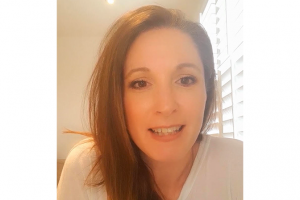
Clare Baker—has worked in the trade union movement for 20 years and has been involved in education and equality program=memes in the predecessor unions of Unite. Clare works in the international department of Unite and co-ordinates the unions work with the global and European trade union federations in public services, construction and Food, drink agricultural sectors. Clare also coordinated the work of the transatlantic trade union– Workers Uniting – that Unite is part of with United steelworkers of USA and Canada and Los miners of Mexico. She works on a number of unions solidarity campaigns including on Colombia and Palestine and is the secretary to the trade union campaign freedom for Öcalan.
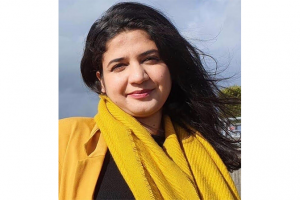
Roza Salih—is a candidate for the Scottish National party for the upcoming Scottish elections and a human rights activist. She is Kurdish and was born in Southern Kurdistan and was a refugee seeking asylum in Scotland in 2001. She co-founded the Glasgow girls a campaign group to stop UK border agency’s carrying our dawn raids and detaining and deporting children – https://en.wikipedia.org/wiki/Glasgow_Girls_(activists)
Baroness Christine Blower (Baroness Blower of Starch Green)—is the former General Secretary of the National Union of Teachers), she is vice Chair of Unite Against Fascism and also the co-chair of the UK trade union campaign Freedom for Öcalan.
International Initiative “Freedom for Ocalan – Peace in Kurdistan”
https://www.freeocalan.org/main
Freedom for Ocalan Trade Union Campaign UK
https://www.freedomforocalan.org
Peace in Kurdistan

